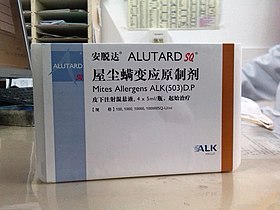| Allergen immunotherapy | |
|---|---|
 An Alutard SQ injection kit | |
| Other names | Desensitization, hypo-sensitization |
Allergen immunotherapy, also known as desensitization or hypo-sensitization, is a medical treatment for environmental allergies (such as insect bites) and asthma.[1][2] Immunotherapy involves exposing people to larger and larger amounts of allergens in an attempt to change the immune system's response.[1]
Meta-analyses have found that injections of allergens under the skin are effective in the treatment of allergic rhinitis in children[3][4] and in asthma.[2] The benefits may last for years after treatment is stopped.[5] It is generally safe and effective for allergic rhinitis, allergic conjunctivitis, allergic forms of asthma, and stinging insects.[6] The evidence also supports the use of sublingual immunotherapy against rhinitis and asthma, but it is less strong.[5] In this form the allergen is given under the tongue and people often prefer it to injections.[5] Immunotherapy is not recommended as a stand-alone treatment for asthma.[5]
Side effects during sublingual immunotherapy treatment are usually local and mild and can often be eliminated by adjusting the dosage.[7] Anaphylaxis during sublingual immunotherapy treatment has occurred on rare occasions.[7]
Potential side effects related to subcutaneous immunotherapy treatment for asthma and allergic rhinoconjunctivitis include mild or moderate skin or respiratory reactions.[8] Severe side effects such as anaphylaxis during subcutaneous immunotherapy treatment are relatively uncommon.[8]
Discovered by Leonard Noon and John Freeman in 1911, allergen immunotherapy is the only medicine known to tackle not only the symptoms but also the causes of respiratory allergies.[9] A detailed diagnosis is necessary to identify the allergens involved.[10]
- ^ a b "Allergen Immunotherapy". April 22, 2015. Archived from the original on 9 September 2016. Retrieved 15 June 2015.
- ^ a b Abramson MJ, Puy RM, Weiner JM (August 2010). "Injection allergen immunotherapy for asthma". The Cochrane Database of Systematic Reviews (8): CD001186. doi:10.1002/14651858.CD001186.pub2. PMID 20687065.
- ^ Penagos M, Compalati E, Tarantini F, Baena-Cagnani R, Huerta J, Passalacqua G, et al. (August 2006). "Efficacy of sublingual immunotherapy in the treatment of allergic rhinitis in pediatric patients 3 to 18 years of age: a meta-analysis of randomized, placebo-controlled, double-blind trials". Annals of Allergy, Asthma & Immunology. 97 (2): 141–8. doi:10.1016/S1081-1206(10)60004-X. PMID 16937742.
- ^ Calderon MA, Alves B, Jacobson M, Hurwitz B, Sheikh A, Durham S (January 2007). "Allergen injection immunotherapy for seasonal allergic rhinitis". The Cochrane Database of Systematic Reviews. 2007 (1): CD001936. doi:10.1002/14651858.CD001936.pub2. PMC 7017974. PMID 17253469.
- ^ a b c d Canonica GW, Bousquet J, Casale T, Lockey RF, Baena-Cagnani CE, Pawankar R, et al. (December 2009). "Sub-lingual immunotherapy: World Allergy Organization Position Paper 2009". Allergy. 64 (Suppl 91): 1–59. doi:10.1111/j.1398-9995.2009.02309.x. PMC 3488881. PMID 20041860. S2CID 10420738.
- ^ Rank MA, Li JT (September 2007). "Allergen immunotherapy". Mayo Clinic Proceedings. 82 (9): 1119–23. doi:10.4065/82.9.1119. PMID 17803880.
- ^ a b "Sublingual Immunotherapy (SLIT)". ACAAI Public Website. 2015-01-05. Retrieved 2018-11-05.
- ^ a b Erekosima N, Suarez-Cuervo C, Ramanathan M, Kim JM, Chelladurai Y, Segal JB, et al. (March 2014). "Effectiveness of subcutaneous immunotherapy for allergic rhinoconjunctivitis and asthma: a systematic review". The Laryngoscope. 124 (3): 616–27. doi:10.1002/lary.24295. PMID 23832632. S2CID 8796632.
- ^ Durham S (2010). "One hundred years of allergen immunotherapy: Time to ring the changes". J Allergy Clin Immunol. 127 (1): 3–7. doi:10.1016/j.jaci.2010.11.032. PMID 21211638.
- ^ Sastre J (2013). "Molecular diagnosis and immunotherapy". Current Opinion in Allergy and Clinical Immunology. 13 (6): 646–650. doi:10.1097/ACI.0b013e328364f4c6. ISSN 1528-4050. PMID 24071714. S2CID 43357832.